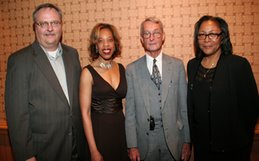
At Forum, Democrats Differ on Health Care
Funding Plans Include Raising Taxes, Ending War, Reshaping the Insurance System
(Note: When he was in OKC last week, Sen. Obama said he would ensure health care for all Americans by the end of his first term as president. Gov. Richardson also addressed the issue last week in OKC from the perspective of his state's executive experience. The issue continues to be one that Oklahomans will seriously consider as Oklahoma's presidential preferential primary approaches on Feb. 5, 2008.)
By Dan Balz
Washington Post Staff Writer
Sunday, March 25, 2007; A05
LAS VEGAS, March 24 -- Democratic presidential candidates were united here Saturday in pledging to provide universal health care to all Americans but differed over how quickly the changes could be achieved and, more important, whether they would have to raise taxes to pay for it.
The candidates addressed what has become perhaps the nation's most intractable domestic issue and all said that, because of rising costs of care and the lack of insurance for about 45 million Americans, incremental steps are no longer adequate.
"What we need is big, bold, dramatic change," former North Carolina senator John Edwards said.
New York Sen. Hillary Rodham Clinton was part of the last significant effort to overhaul the system during her husband's administration. That attempt failed, but the Democratic candidates said Saturday that the conditions exist to push for dramatic change.
But Clinton warned that getting there would still be difficult. "We don't just need candidates to have a plan," she said. "All of them have plans. We need a movement. We need people to make this the number one voting issue in the '08 election."
The long-scheduled presidential forum on health care came just two days after Edwards made an announcement about the health of his wife, Elizabeth. She was for treated for breast cancer after the 2004 election, and he said Thursday that the disease had returned. She joined her husband at the forum, sitting in the front row as he outlined his plan and giving him a hug and kiss as he descended from the stage amid the flash of cameras and applause from the audience.
Edwards repeated his vow to remain in the presidential campaign despite his wife's illness. "This is not the first challenge like this that Elizabeth and I have been through," Edwards said, recalling not only his wife's initial bout with breast cancer but also the death of their son 11 years ago. "We know what it's like to function in a very difficult environment."
The other candidates who appeared here praised Elizabeth Edwards for her courage and called her an inspiration to other Americans in her battle against incurable cancer. But Edwards, acknowledging the outpouring of support that he and his wife have received since Thursday, noted that millions of women deal with similar illnesses, often without adequate health insurance or the financial resources that he and his wife have.
"I think we're getting too much credit," he said.
Saturday's forum was jointly sponsored by the Service Employees International Union and the Center for American Progress Action Fund, part of a left-of-center think tank based in Washington. The forum was moderated by Karen Tumulty of Time magazine. It was on the campus of the University of Nevada at Las Vegas, in the state that is scheduled to host the second caucus of the 2008 Democratic nomination battle.
The candidates spoke and fielded questions individually but did not engage one another. Also participating were Illinois Sen. Barack Obama, New Mexico Gov. Bill Richardson, Connecticut Sen. Christopher J. Dodd, Ohio Rep. Dennis J. Kucinich and former Alaska senator Mike Gravel.
Edwards was the only candidate who came to the forum having put forth a specific plan for universal coverage and said it would cost $90 billion to $120 billion a year. He also was the most explicit about the revenue implications of universal coverage, saying that to pay for it he would raise taxes by rolling back President Bush's tax cuts for Americans earning more than $200,000 a year.
"I do not believe you can have universal health care without finding a source of revenue," he said, adding: "We don't get universal health care for free."
Edwards was followed by Richardson, who for the first time offered details of his plan for universal coverage. As a governor who has made his record of cutting taxes in New Mexico part of his calling card as a candidate, Richardson said his plan would not require new revenue. "This is a plan that would not add bureaucracy," he said. "This is a plan that could be paid for without any new taxes."
Richardson said he would fund his proposal by ending the war in Iraq and shifting some of the billions being spent there to health care.
Clinton skirted the question of raising taxes. Noting that she was prepared to make some modest new investments to improve aspects of the system, she said: "I don't think we should start with the position where we say we're going to increase all of these costs by putting more money into a system that is broken. We have to fix the system."
She called for an end to "insurance discrimination" and said she was prepared for a "big political battle" to take money from insurance companies and others who "make out really well." But, referring to her experience in the 1990s, she said, "I know better than anybody how hard this is going to be."
Obama joined in pledging support for universal care but said he had not concluded how much additional revenue it might take. "I will do whatever it takes," he said.
A member of the audience challenged him by saying she had gone to his campaign Web site and could not find any serious discussion about how he would expand coverage. Obama said his campaign is just eight weeks old and that he is still in the process of developing a plan of his own.
But he suggested that plans are less important than the political skills required to force a national consensus. "Everybody's going to have some good ideas," he said. "The question is, are we able to bring a majority of people together around the need to solve the problem now?"
Dodd said the climate for change "is a lot better" now than it was in 1994 and said that he may be best positioned to execute an overhaul because of long-standing relationships with the key Republican and Democratic legislators who control health-care legislation. "I've known every one of them for 30 years. . . . They know me; I know them," he said.
Richardson said he would hope to achieve universal coverage during the first year of his presidency. Edwards and Obama set goals of accomplishing the changes by the end of their first terms. Dodd said he would make it his top priority and hoped to reach the goal "in far less than four or eight years."
Clinton has said it might take two full terms to fully implement universal coverage. "I think we can move more quickly," she said, "but make no mistake about it, this will be a series of steps."
Most of the candidates said they would build their plans on the current employer-based system, although most also talked about making the same plan used by members of Congress and federal government employees available to all Americans.
Kucinich and Gravel disagreed with those ideas. Gravel called proposals to build on the employer-based plan "a Band-Aid that's not going to work."
Kucinich said the front-running candidates are not willing to break the hold of the insurance companies on health care. He said he would push for a single-payer, not-for-profit system, adding, "It's waiting for a candidate who will lead the way."

No comments:
Post a Comment